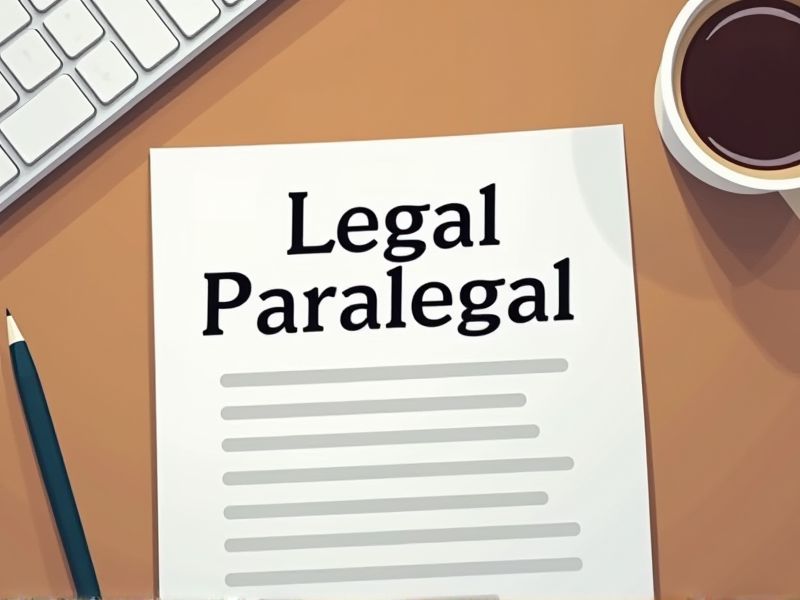
Legal paralegals operate within a complex legal system, requiring specialized knowledge to assist lawyers effectively, ensuring accuracy in legal processes and documentation. Certifying credentials assure both employers and clients of a paralegal's competency and adherence to industry standards. With the evolving landscape of laws and regulations, certifications ensure paralegals are equipped with the most up-to-date legal knowledge and skills. Some essential certifications that may be needed for legal paralegals include the following.
NALA Certified Paralegal (CP)
Attaining the NALA Certified Paralegal (CP) designation enhances a paralegal's professional credibility within the legal industry. This certification ensures that a paralegal has met national competency standards, which can lead to increased job opportunities and career advancement. Employers often seek NALA CPs as it assures them of the paralegal's commitment to continuing education and adherence to ethical guidelines. This qualification can also result in higher salary prospects and greater job security due to the recognized proficiency and expertise it signifies.
NALA Paralegal Advanced Competency Exam (PACE)
The NALA Paralegal Advanced Competency Exam (PACE) certifies a paralegal's mastery of advanced legal principles, increasing their professional credibility. This certification can lead to greater career opportunities and higher earning potential as it distinguishes paralegals who have achieved a significant level of expertise. By passing the exam, paralegals demonstrate comprehensive knowledge and maintain ethical standards, which is crucial in a competitive legal environment. The PACE also ensures ongoing professional development, as certified paralegals are required to engage in continuous education to maintain their certification.
NFPA Certified Paralegal
A NFPA Certified Paralegal credential demonstrates a standardized level of knowledge and proficiency in legal procedures, which increases credibility and trust within legal teams and clients. This certification ensures that paralegals are committed to ongoing education, staying updated with legal developments and industry regulations. Employers often seek certified paralegals as they are perceived to improve the quality and efficiency of legal services provided. Investing in certification can lead to greater career advancement opportunities and salary potential for paralegals.
NALS Certified Legal Assistant (CLA)
The NALS Certified Legal Assistant (CLA) credential enhances a paralegal's professional credibility, allowing them to demonstrate a tested level of legal knowledge and skills. Obtaining the CLA certification often leads to increased job opportunities and potentially higher salaries, as employers recognize the value of certified professionals. Legal fields demand precision and efficiency; the CLA certification ensures paralegals meet these industry standards. With law continually evolving, the CLA designation indicates a commitment to staying current with legal developments and ongoing professional growth.
Certified E-Discovery Specialist (CEDS)
Increasing complexity in electronic data requires specialized knowledge for effective legal analysis, making a Certified E-Discovery Specialist essential. Legal paralegals with CEDS certification are adept at identifying, preserving, and managing digital evidence crucial for litigation success. Compliance with data protection regulations mandates that legal teams have experts proficient in e-discovery protocols. As technology evolves, a CEDS-certified paralegal can ensure cost efficiency and accuracy in handling digital information.
LexisNexis Legal Research Certification
LexisNexis Legal Research Certification equips paralegals with advanced research skills, crucial in efficiently navigating complex legal databases. Employers often seek certified professionals, leading to increased job prospects and potential career advancement. Certified paralegals can more effectively support attorneys through comprehensive case law and statutory research. Enhanced accuracy and speed in legal research contribute to better client outcomes, reinforcing the value of certification in legal settings.
Westlaw Certification
Westlaw Certification enhances a paralegal's research skills, making them more effective in legal support roles. Employers value certified individuals as it indicates a higher proficiency in navigating complex legal databases. This certification often leads to increased job opportunities and career advancement. Proficient use of Westlaw can result in more efficient legal research, reducing time and resources spent on case preparation.
Certified Legal Manager (CLM)
Legal paralegals benefit from a Certified Legal Manager (CLM) as it equips them with essential management skills that drive efficiency in legal operations. Earning the CLM credential enhances a paralegal's credibility and positions them as valuable assets in law firms. The advanced knowledge in financial management, organizational management, and human resources provided by CLM training enables paralegals to take on increased responsibilities. Law firms seek CLM-certified individuals for their demonstrated commitment to professional growth and capability in navigating complex legal environments.
Microsoft Office Specialist (MOS) Certification
Possessing a Microsoft Office Specialist (MOS) Certification boosts a paralegal's proficiency in managing documents, a core task in legal settings. Employers prioritize candidates who demonstrate advanced skills in Word and Excel, integral for drafting legal documents and managing client data. The certification provides an edge in competitive job markets, proving competency in essential software applications. Efficient use of Office tools can reduce errors and increase productivity, critical factors in legal environments.
Project Management Professional (PMP) Certification
Paralegals involved in complex legal projects benefit from PMP certification by gaining structured project management skills, enhancing their efficiency in case management. The certification provides paralegals with a standardized approach to planning, executing, and closing legal projects, which aligns with law firms' increasing demand for project-based work. PMP certification can improve communication and coordination within legal teams, reducing errors and improving client satisfaction. Legal paralegals with this certification often see career advancement opportunities due to their ability to manage multifaceted legal tasks effectively.
Summary
Acquiring certifications as a Legal Paralegal can significantly enhance your expertise and credibility within the legal field. This advancement typically results in better job opportunities and the potential for salary increases. You may also find that certifications expand your professional network by connecting you with other certified professionals. The knowledge gained often leads to increased efficiency and productivity in your role.
